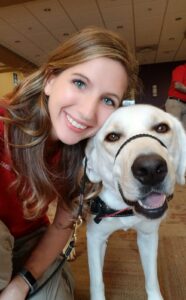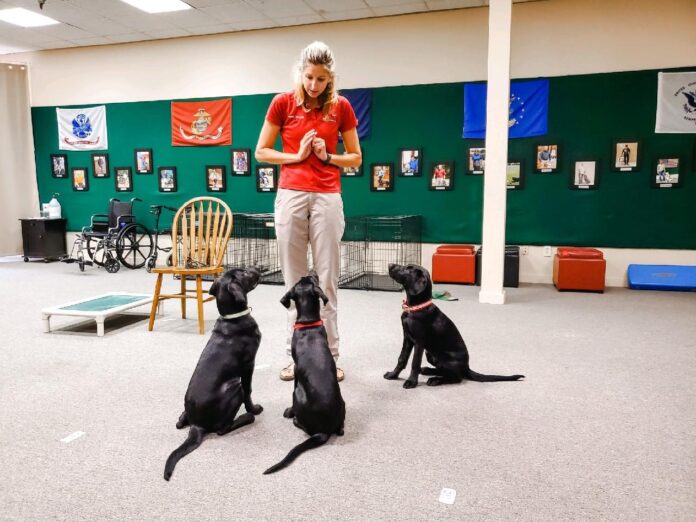After working her dream job of training dolphins for several years at Gulf World Marine Park in Panama City Beach, Florida, Cassie Krause ’10 made a career change: taking a position in which she was, well, a fish out of water.
For the past five years, Krause has worked as a service dog trainer for Smoky Mountain Service Dogs in Lenoir City, Tennessee, just outside of Knoxville. She trains puppies for veterans with disabilities, especially those with mobility assistance needs.
“It’s something I’m good at that I didn’t think I’d be good at,” Krause said. “Dog training is a dream that I didn’t know was a possibility. It’s really cool to know that I can combine my passion for animals and give back to the military.”
Krause, who graduated with a degree in wildlife sciences from the College of Natural Resources and Environment and a minor in biology from the College of Science, serves as the lead puppy trainer for Smoky Mountain Service Dogs. She trains puppies from an age range of 8-weeks old to 1-year old. She currently works with 16 puppies that, after a year with Krause, advance to the next stage of training at the company’s facility to work with a different trainer.
(Cassie Krause was featured in the summer issue of Virginia Tech Magazine, along with several other alumni. Read about them.)
Krause never expected to be a service dog trainer. At Gulf World Marine Park, she worked with bottle-nosed dolphins, California sea lions, and parrots. She performed shows, helped with educational outreach, and participated in rehabilitation efforts of animals that were rescued from dire circumstances.
But a desire to be closer to Virginia, where her parents lived, led her to start a job search.
“This job found me,” Krause said. “I was surprised to have found it. I never even thought about service dog training as a career. I was always interested in the exotic animals, but I thought this was cool, so I applied.”
Part of the interest stemmed from her love of Virginia Tech’s Corps of Cadets. Krause wasn’t a cadet, but she respected and admired their commitment to service.
Now, she finds herself giving back to service members who, in most cases, have sacrificed so much for their country. Her position allows her to combine two passions: a love for animals and a desire to give back.
“Serving our country, our service men and service women, is pretty awesome,” Krause said. “It’s like, ‘Hey, let me help you get through the day by having this animal that can help take care of you and be your battle buddy and make every day a little easier.’
“Human companionship can only go so far. People don’t like to feel that they’re a burden, but when you have this canine companion that the sight of it brings you joy, then you feel the responsibility for the dog. It’s, ‘OK, he’s taking care of me, so I’ve got to take care of him. I’ve got to take him out. I’ve got to take him for these walks. That, in turn, will help me get out and get better.’ It’s kind of cool how this job fell into my lap. The stars aligned.”

Krause’s company works mostly with two breeds of dogs — Labrador retrievers and golden retrievers. These dogs innately know how to hold items gently in their mouths, so they require less training to pick things up. More importantly, though, the two breeds are beloved by society and create an avenue for conversation between veterans and the general public.
“Going into public places, strangers seeing a veteran who might be tousled-looking or has a sterner face, they may unfairly judge the veteran,” Krause said. “But if they see a golden retriever or a Lab companion with them, they’ll be more approachable. Those two breeds are the friendliest to look at and more likely to be accepted into places, and the veterans will feel more comfortable because the public perception is a positive one.”
Smoky Mountain Service Dogs also likes these two breeds because of their energy. Staff members work with the dogs that have more energy and show more motivation. The strategy is by design.
“We’re looking for those types to help motivate the veterans to keep moving forward,” Krause said. “We’re not looking for a dog to lie next to you on the couch. This is a dog that’s going to get you out there, get you moving and feeling better about going in public places and not feeling secluded.”
Krause said that service dogs require roughly two years of training, though that varies depending on the personality of the dog. Smoky Mountain Service Dogs works throughout the process to pair a veteran with a dog that meets his or her needs.
“It’s not a cookie-cutter system in which there’s a line of veterans waiting, and then it’s first-come, first-serve with whatever dog is available,” Krause said. “We try to really look at the veteran’s lifestyle; and how the dog that’s ready to graduate will fit into that lifestyle.”
Once the dogs pass all their evaluations at the training facility, they go to live with advanced foster volunteers for an indefinite period to apply all their learned skills in real-life situations, like picking up keys or a ringing cellphone. After that, they return to the training facility for a client camp with the veteran.
“We go through all the behaviors with the veteran and the dog just to build their relationship and their confidence with each other,” Krause said. “At the end of their training camp, the veteran has the option of a live-streamed graduation ceremony, where volunteers and other members of the community may come and celebrate the veteran and their new service dog. It’s a heartwarming time, where we honor the veterans and welcome them into the Smoky Mountain Service Dogs family.”
Veterans are able to get the service dogs at Smoky Mountain Service Dogs for free. Fundraising efforts and grant money cover the costs of the care, the training for the dogs, and the staff’s salaries.
As for Krause, she believes she is working her dream job again.
“It’s nice to watch them grow up and fulfill their destiny of being a great service dog,” Krause said. “They’re going to help somebody live such a different life that they didn’t think was possible and make them so happy. I’m glad I get the year with them to be happy, and this person is going to have a lifetime of happiness due to this dog.”

